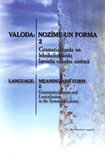Atgriezenisko kustības verbu daudznozīmība latviešu valodā
Polysemy of Reflexive Verbs of Motion in the Latvian Language
Author(s): Ieva KuplāSubject(s): Language and Literature Studies, Theoretical Linguistics, Morphology, Lexis, Semantics, Baltic Languages
Published by: Latvijas Universitātes Akadēmiskais apgāds
Keywords: gramatizēšanās; leksikalizēšanās; īsti refleksīva verba nozīme; reciproka jeb savstarpējas darbības nozīme; autokauzatīva nozīme; aspektuāla nozīme; dekauzatīva nozīme; modāla kvazipasīva nozīme;
Summary/Abstract: The article explores the lexicalization of polysemous reflexive verbs of motion and the systems of their meanings. In order to establish the peculiarities of the meaning systems of reflexive verbs of motion more successfully, the systems of their meanings are opposed to those of non-reflexive verbs. The analyzed reflexive verbs of motion are divided into the following groups: reflexive verbs the basic meanings of which differ from the basic meanings of non-reflexive verbs due to reflexivity only – staipīties ‘to stretch’, ārdīties ‘to rave’, sviesties ‘to get along in how are you getting along?’, rauties ‘to shrink’; reflexive verbs the basic meanings of which are withdrawn from the basic meanings of non-reflexive verbs – ņemties ‘to toil’, laisties ‘to fly’, and reflexive verbs that lack non-reflexive verbs – tuvoties ‘to get closer’, mosties ‘to awake’. The meaning systems of the reflexive verbs of motion mentioned above are taken from the “Dictionary of the Latvian Language”.The meaning of the reflexive verbs can be classified by the activity area they describe, that is, subject and object domains. The following meanings of the reflexive verbs are the most common in the systems of reflexive verbs of motion in the Latvian language: in subject domain – prototypical reflexive meaning, reciprocal or mutual activity meaning, autocausative meaning, aspectual meaning, in impersonal domain – modal accidental meaning; in object domain – decausative meaning, modal quasi-passive meaning and negative modal meaning.Observing the meaning systems of reflexive verbs it can be concluded that they are to be considered as separate lexemes:1 As there are reflexive verb meaning systems created independent from the meaning systems of non-reflexive verbs.2 Meaning systems are created also by those reflexive verbs that have no appropriate non-reflexive verb.
Journal: Valoda: nozīme un forma
- Issue Year: 2012
- Issue No: 2
- Page Range: 94-105
- Page Count: 12
- Language: Latvian

